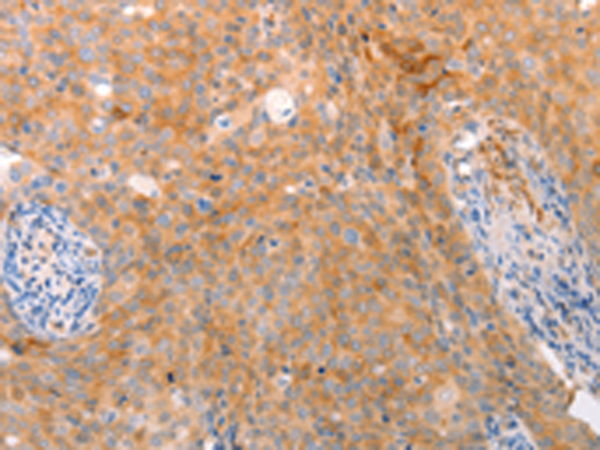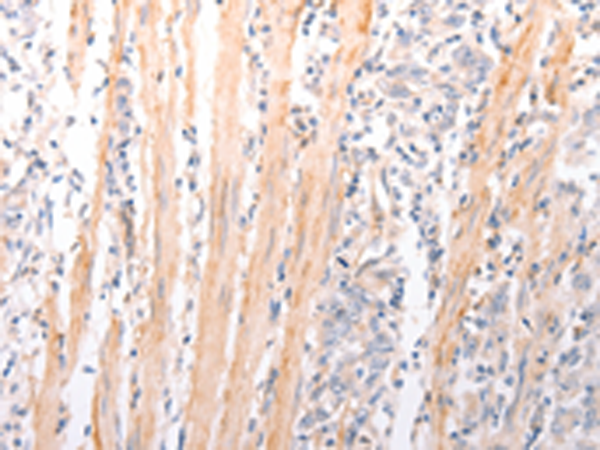

| WB | 咨询技术 | Human,Mouse,Rat |
| IF | 咨询技术 | Human,Mouse,Rat |
| IHC | 1/25-1/100 | Human,Mouse,Rat |
| ICC | 技术咨询 | Human,Mouse,Rat |
| FCM | 咨询技术 | Human,Mouse,Rat |
| Elisa | 1/2000-1/5000 | Human,Mouse,Rat |
| Aliases | ABC2 |
| Host/Isotype | Rabbit IgG |
| Antibody Type | Primary antibody |
| Storage | Store at 4°C short term. Aliquot and store at -20°C long term. Avoid freeze/thaw cycles. |
| Species Reactivity | Human, Mouse, Rat |
| Immunogen | Synthetic peptide of human ABCA2 |
| Formulation | Purified antibody in PBS with 0.05% sodium azide and 50% glycerol. |
+ +
以下是关于ABCA2抗体的3篇参考文献及其简要摘要:
---
1. **文献名称**: *ABCA2 transporter deficiency reduces amyloid-β production and ameliorates Alzheimer’s disease-related pathology*
**作者**: Kim, W.S., et al.
**摘要**: 该研究利用ABCA2缺陷小鼠模型,发现ABCA2缺失可降低β-淀粉样蛋白(Aβ)的生成,并减轻阿尔茨海默病相关病理。通过免疫印迹和免疫组化分析,证实ABCA2抗体在检测脑组织中ABCA2表达及定位中的关键作用。
---
2. **文献名称**: *Characterization of the ATP-binding cassette transporter ABCA2 in human glioblastoma cells*
**作者**: Takeda, M., et al.
**摘要**: 作者通过Western blot和流式细胞术,使用ABCA2特异性抗体研究其在胶质母细胞瘤细胞中的表达。结果表明,ABCA2高表达与化疗药物耐药性相关,可能成为潜在治疗靶点。
---
3. **文献名称**: *ABCA2 regulates sphingolipid metabolism and survival in oligodendrocytes*
**作者**: Mack, J.T., et al.
**摘要**: 该研究利用ABCA2抗体进行免疫荧光染色,发现ABCA2在少突胶质细胞中调控鞘脂代谢,其缺失导致细胞存活率下降,提示其在维持髓鞘稳态中的重要作用。
---
4. **文献名称**: *ABCA2 as a therapeutic target in cancer and neurodegenerative disorders*
**作者**: Chen, Z., & Santos, A.
**摘要**: 综述文章总结了ABCA2在癌症(如前列腺癌)和神经退行性疾病中的功能,强调其抗体在诊断及靶向治疗开发中的应用潜力,包括临床前模型中抗体的实验验证。
---
以上研究均涉及ABCA2抗体的应用,涵盖疾病机制探索及治疗潜力分析。如需具体文章链接或更多细节,建议通过PubMed或Google Scholar按标题检索。
The ABCA2 antibody is a research tool designed to detect and study the ATP-binding cassette subfamily A member 2 (ABCA2) protein, a transmembrane transporter belonging to the ABC superfamily. ABCA2 is primarily expressed in the central nervous system, particularly in oligodendrocytes, and plays roles in lipid metabolism, intracellular trafficking, and lysosomal function. It is implicated in myelination processes and neuronal homeostasis, with studies suggesting its involvement in cholesterol transport and sphingolipid distribution.
ABCA2 has garnered attention due to its potential links to neurological disorders, including Alzheimer's disease, and certain cancers. Mutations or dysregulation of ABCA2 may contribute to pathological lipid accumulation or drug resistance in cancer cells. The ABCA2 antibody enables researchers to investigate its expression patterns, subcellular localization (e.g., endosomal/lysosomal compartments), and interactions with other molecules through techniques like Western blotting, immunohistochemistry, and immunofluorescence.
Recent studies also explore ABCA2's role in modulating responses to chemotherapeutic agents, highlighting its relevance in oncology. However, its precise molecular mechanisms remain partially unresolved. The development and validation of specific ABCA2 antibodies continue to support efforts to clarify its physiological functions and therapeutic potential in disease contexts.
×